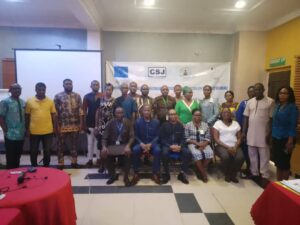
By Uzo Ugwunze
The Chairman, Code of Conduct Bureau (CCB), Dr. Abdullahi Usman, has restated its commitment to strict enforcement of the provisions of the Assets Declaration Law among public office holders in Anambra State and beyond.
Dr. Usman, stated this in Awka, at the commencement of a 2-day Rule of Law and Anti-corruption (RoLAC 2) capacity building workshop on the On-line Assets Declaration System, themed, “Improving the Effectiveness of Anti-corruption Processes and Reforms” organized by Centre for Social Justice (CSJ) in collaboration with the Bureau.
Represented by Head, Education Department, Koyonda Edward, Usman restated CCB’s resolve to ensure transparency and accountability in governance, through sustained innovation and collaboration with relevant stakeholders aimed at increased compliance with asset declaration requirements among public officials.
According to Usman, corruption has remained a significant hurdle to Nigeria’s development, eroding public trust, stifling economic growth, and perpetuating inequality. “Combating the monster of corruption is a collective responsibility while government takes the lead with policies, laws and strict enforcement of such laws.
“Code of Conduct Bureau, as a cornerstone of Nigeria’s integrity framework, recognizes that asset declaration is not only a statutory requirement but also a moral imperative, forming the foundation of ethical governance.
“This technology helps to eliminate bureaucratic bottlenecks, reduces human interference and creates an acceptable trail that deters malfeasance. This system will empower public officials to declare Assets seamlessly while enabling real-time monitoring by shareholders.
The CCB Chairman noted that the capacity building workshop is aimed at fostering ownership and nurturing collaboration, while demystifying the technical and operational aspects of the on-line platforms, and addressing challenges revolving around cybersecurity, accessibility and compliance.
“It will also strengthen partnerships between institutions, civil societies and citizens to ensure collective vigilance. To our participant, your feedback is vital. The system must be user friendly, inclusive and resilient. Your insights will shape its success. Let us harness the power of technology to safeguard our Nation’s resources and restore public confidence,” he pleaded.
In his presentation on “Categories of Assets and Liabilities”, Eze Onyekpere, the Lead Director Centre for Social Justice, explained that the primary goal of the training was to educate citizens, civil servants and Civil society advocates on the online assets declaration system as well as relevant laws and regulations.
He noted that while public servants are obligated to declare their assets, compliance rates are unclear, and public awareness of the requirement is limited. “According to the law, both the President and cleaner in the local government are obliged to declare their assets. We’re also here to sensitize the public on the need to contribute to the verification process and that of entrenching accountability and transparency in the system.”
While hinting that the workshop was the maiden edition at the state level, Onyekpere, a lawyer assured cascading the training to grassroots through train-the-trainers approach.




